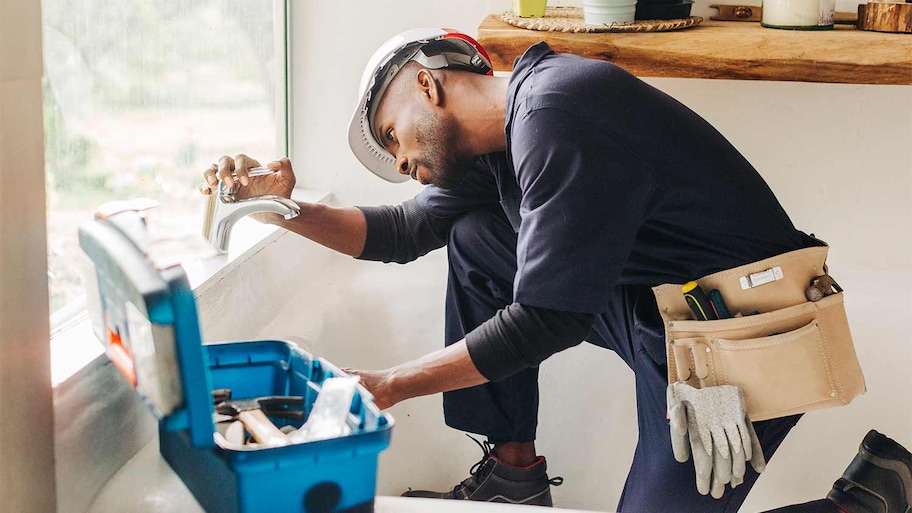Plumber Cost Breakdown
You might notice that plumbing rates amount to quite a bit more than you’d pay for the part itself, but that doesn’t mean it’s all in your plumber’s pocket. Here’s a breakdown of what the extra costs cover.
Plumber Hourly Rate
A portion of your plumber's costs will cover wages. On average, a plumber near you will charge anywhere from $45 to $200 per hour, though you may also pay for a minimum number of hours or a flat service fee.
Expertise
Early-career plumbers will often work under the guidance of a journeyperson or master plumber. These apprentices will have lower plumber rates than their seasoned counterparts.
Depending on local labor laws, a journeyperson plumber will need at least four years of on-the-job training and pass a state exam. Master plumbers will have at least seven years of experience, pass a state exam, and often own their own businesses.
If you’re dealing with a complex job, it’s best to pay for the plumber who’s been in the game for at least five to 10 years. Here are some rates to expect from each level of a trained pro.
| Plumber’s Title | Plumber’s Average Hourly Rate |
|---|---|
| Apprentice | $45 – $90 |
| Journeyperson | $60 – $110 |
| Master | $80 – $200 |
Complexity

Not all plumbing jobs are as simple as removing a clog or tightening a faucet. If your plumber needs to order new parts, dig a trench for new pipes, or alter the structure of your home to make the repair, the price will rise. The cost to repipe a house, for example, averages $7,500, much higher than the average of most plumbing jobs.
Complex plumbing jobs not only extend the amount of time the repair takes but may also require additional expertise. For example, a pro may have to call in a master plumber or a team member with a specific license to assist with main lines, septic systems, or water damage.
Tools and Materials

Your plumber cost covers all the necessary supplies and materials to fix your emergency ASAP. Not only that: Your plumber has also invested a lot into their tool collection, which is typically quite extensive to cover a range of needs. Most jobs get taken care of on the spot, and that preparation is folded into your plumber’s hourly rate.
Permits
A larger number of plumbing repairs and renovations require a permit than you may think. Even some small plumbing jobs call for both a permit and the sign-off of a licensed plumber. Plumbing permit prices will cost an average of $75 but can range anywhere from $50 to $500, depending on the size of the project. Always check with your county's building codes, even before attempting a plumbing fix on your own.
Union Fees
Most plumbers need to pay around 20% to 25% of their wages to cover union fees. This also provides them with insurance, pension, and other benefits.
How Much Does a Plumber Cost by Repair Type?
Sometimes you might forgo the typical plumbing rates per hour and pay a flat fee to cover the plumbing repair cost instead. Many plumbers will figure out a solid rate for common jobs, so this is a good area to compare plumber quotes and look for the best deal.
| Plumbing Project | Average Cost Range |
|---|---|
| Fix a Leak | $150 – $700 |
| Install or Repair Gas Lines | $250 – $750 |
| Water Main Repair | $300 – $1,250 |
| Water Main Installation | $600 – $2,400 |
| Septic Tank Repair | $600 – $2,500 |
| Bathtub Installation | $1,000 – $5,100 |
| Shower Installation | $1,200 – $5,500 |
| Drain Line Repair | $250 – $1,000 |
| New Pipe Installation | $350 – $1,750 |
| Toilet Repair | $150 – $300 |
| Sewer Line Cleaning | $175 – $450 |
| Water Heater Installation | $750 – $3,000 |
| Unclogging a Drain | $125 – $300 |
| Sump Pump Installation | $650 – $1,800 |
| Sump Pump Repair | $300 – $700 |
Additional Cost Factors for Plumber Hourly Rates
If you’re wondering how to hire the best plumber, you should look for certain favorable (and some mandatory) qualifications. Suspiciously low plumber quotes often point to cutting corners, so it helps to consider all the plumber cost factors at play. Along with location and job type, these will all play a big part in your plumber’s hourly rate.
Residential vs. Commercial Plumber Rates
Smaller plumbing companies might charge a lower hourly rate than well-known corporate ones. Commercial plumbers average about $100 per hour, while residential plumber rates are about $80 per hour. This doesn’t mean that inexpensive plumbers are less qualified to fix your sink, but you might have to do your homework. Corporate companies often feature better insurance coverage and quality guarantees, so it’s worthwhile to compare if you’re not pressed for time.
Weekend or Emergency Plumber Cost
If you’re calling during off-hours, expect to pay an overtime rate. You may tap into higher plumber per-hour rates if you need them for a last-minute or weekend emergency. Emergency plumber rates average $150 per hour in addition to flat-rate trip fees between $100 and $350. Most plumbers charge time-and-a-half, double, or even triple their hourly rate to account for overtime.
Service or Diagnostic Fees

If you can’t determine why your toilet won’t stop running or your ceiling is leaking, you’ll need to pay a professional plumber to find the answer. In this case, the plumber will likely charge a diagnostic fee for the time and effort spent locating the problem. Keep in mind that some plumbers may waive the diagnostic fee if you hire them to implement the solution they suggest.
Plumber Flat-Rate Fees
Some plumbers might charge a flat rate or trip fee of $100 to $400, which could be in combination with elevated hourly rates, or instead of them. Plumbers typically charge flat-rate fees for simple service calls like unclogging a drain or toilet.
Trip Fees
If you live outside of the plumber’s typical work zone, they may charge a trip fee of $50 to $300 in addition to labor charges. This fee covers the cost of their travel expenses, and it’s usually applied if you live outside of a certain radius of the plumber’s shop.
Disposal or Haul-Away Fees
Plumbers may tack on a fee to haul away old materials removed during the repair. On average, junk removal costs $240, but a professional may include the service in their flat fee depending on the amount of leftover stuff. If they do not offer this service, you can hire a local junk removal company or pay to rent a dumpster for an average of $380.
Licensure
Yes, you should hire a licensed plumber, and this isn’t necessarily par for the course. Certain states require a license, but not all of them do. In any case, it’s wise to politely ask your plumber for proof of a license. Unlicensed amateur plumbers might cost less, but you’re better off going with the real deal.
Insurance
Finding out whether they have insurance is one of the most important questions to ask a plumber. If they don’t, then you might be financially liable if anything unthinkable happens. Again, uninsured individuals might charge a lower plumber hourly rate, but the extra risk on your end isn’t worth it.
DIY vs. Hiring a Plumber
There are several surefire ways to determine whether you should DIY a plumbing repair or call a plumber near you for the job. First of all, always check whether the job requires a permit. If so, you'll almost always need to hire a licensed professional—though this depends on where you live.
Next, consider your comfort with DIY home projects. If you've snaked a drain before and feel confident that you won't damage an old pipe, have at it. On the other hand, wherever you're in doubt, it is always best to call a professional plumber, even when you can save money upfront. Errors can lead to costly water damage—and not to mention, days without functioning plumbing.
A few popular DIY plumbing projects include installing a new dishwasher hose or unclogging a washer drain. You can also keep up with preventive plumbing care, such as watching for signs of a leak or keeping your pipes from freezing and bursting in the winter.
Ways to Save Money on Plumbing Costs

Trying to find ways to cut down on your plumber’s final bill? Follow these tips to save money on plumbing costs.
Keep up with plumbing maintenance: The best way to save on plumbing costs is to avoid needing to call a plumber. Follow these preventative plumbing maintenance tips to keep your home’s system running smoothly.
Choose the right pipes: Ask your plumber to help you choose the right types of pipes for your home so you can avoid issues with freezing and deterioration.
Repair leaks and cracks quickly: The difference between a quick fix and a major plumbing disaster is how long it takes to resolve the issue. Prevent major issues by repairing small leaks and cracks fast before they grow into larger issues.
Alison Kasch contributed to this piece.





